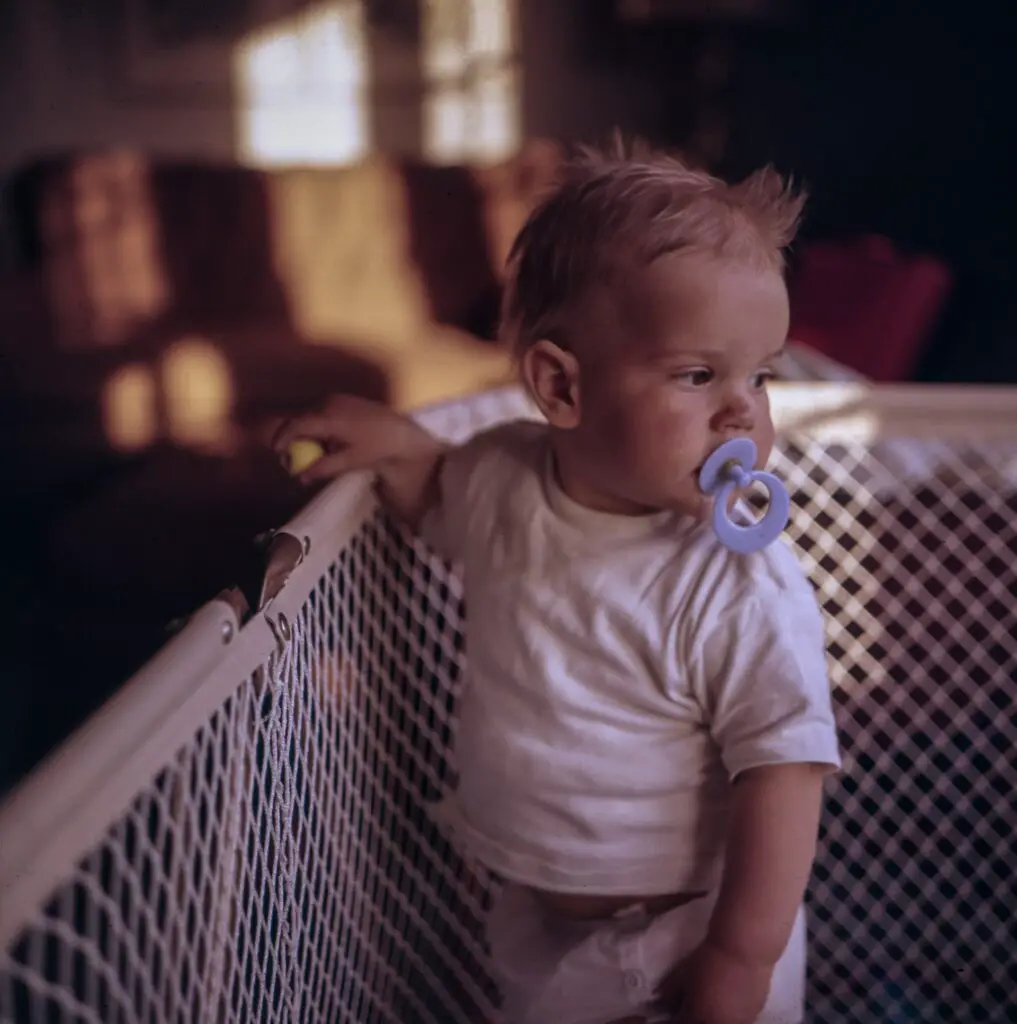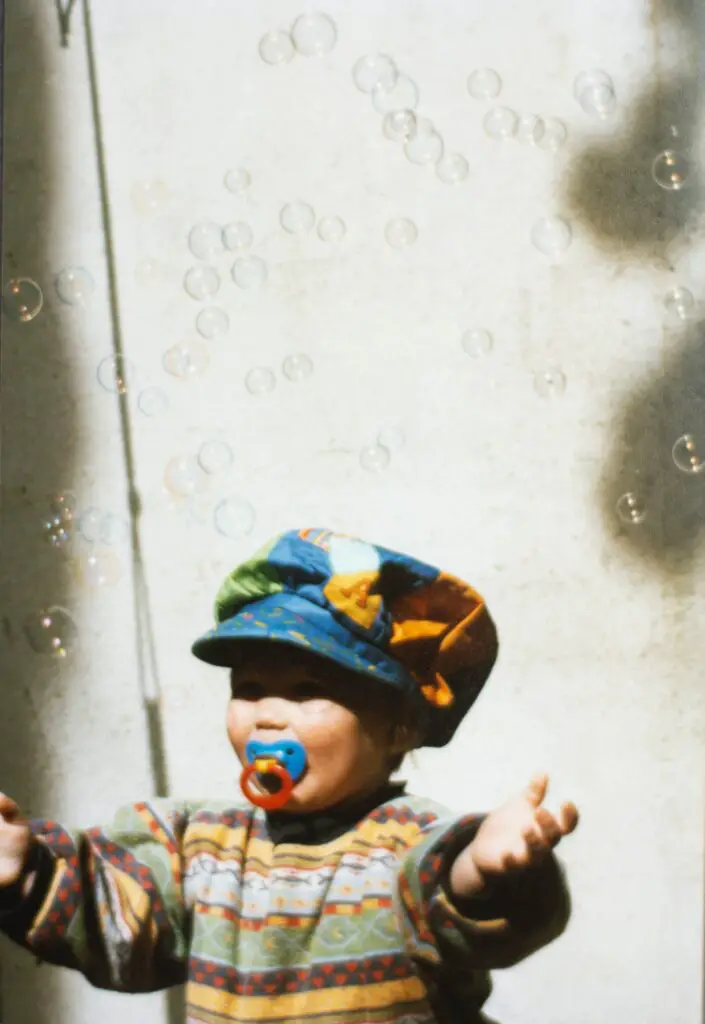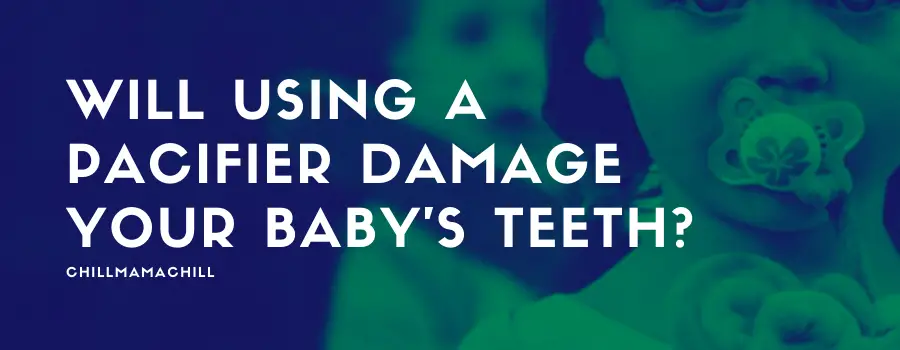Your baby self-soothes by sucking, whether on their thumb, pacifiers, or other objects. It’s their way of exploring their surroundings, developing their senses and it gives them a feeling of security. If used recklessly, however, will using a pacifier damage your baby’s teeth?
If used excessively pacifiers can become hard to wean out, and may result in dental issues. When your child is unable to stop using their binky, an orthodontic problem is called pacifier teeth. That presents with misaligned jaws and teeth which thankfully you can prevent with proper dummy use.
You should give your baby pacifiers not whenever they want but when you need them to calm down or fall asleep. There’s a typical age of binky use that won’t inhibit stellar dental or orthodontic development. Let’s find out how and when will using a pacifier damage your baby’s teeth.
Does Using a Pacifier Cause Dental Problems?
Using a pacifier is a benefit that most parents can barely get on without. Particularly in the early months, you’ll rely on a binky to calm your baby so they can calm down or fall asleep. Without one, you’ll find it difficult to get some much-needed hands-free time. Besides that, dummies are attributed to helping reduce the risks of sudden infant death syndrome or SIDS.

For a teething infant, premature babies, or tots with medical conditions, binkies are a comfort, pain reliever, and help shorten hospital stays. A tube-fed baby for instance will learn how to suck from a bottle by sucking on a pacifier.
The American Dental Association does support pacifier usage. But there’s also proof that prolonged use does lead to ‘pacifier teeth.’ Binkies can interfere with the proper development of your baby’s palate, jaw, and primary teeth growth.
Other than that, constantly sucking on a dummy will keep throat and ear canal auditory tubes continuously open. That allows secretions that promote middle ear or bacterial infections. Preferably, you’d have started your tot on a pacifier at three or four weeks after birth. Whether you’re exclusively breast or bottle feeding, use the same weaning time to get your child off the binky.
When Is the Best Time to Wean Your Child off a Pacifier?
Since your child forms such an emotional attachment to their pacifier at age nine months or older, when is the best time to wean them? Your toddler in particular might prove difficult getting to stop binky use, but you mustn’t allow them to continue past the age of two years.
Damage from using a pacifier usually shows up around four to six years as your child’s permanent teeth are replacing baby teeth. Your little one’s teeth will naturally grow around any shape that’s repeatedly sucked on, be it a binky or a thumb.
Noticeable characteristics of pacifier teeth and other potential problems that can arise from your child’s prolonged pacifier include;
An Open Bite
A type of malocclusion, an open bite is a misalignment of upper and lower teeth. Your child’s teeth will not completely touch or will be angled outwards. Your child’s front teeth may feature large spaces or will not touch even when their mouth of firmly shut.

A Developing Overbite
Prolonged pacifier usage causes overbite which is similar to an open bite except the upper jaw teeth will protrude further outwards than the bottom.
Buck Teeth
These present as crooked or deformed canines and front teeth, which is sometimes hereditary and has nothing to do with using pacifiers.
Mouth Palate or Roof Changes
When your baby’s palate development is hampered by an ever-present pacifier, there’s general misshaping or narrowing of their mouths roof.
Other than these obvious signs of pacifier teeth, using a binky past your child’s third birthday will also result in subsequent dental issues. These include;
- Skin Irritation
The skin is irritated if a pacifier, whether latex or silicone, is always in your baby’s mouth.
- Feeding Problems
Another consequence of prolonged use of binkies is that your child’s feeding patterns are interfered with. Using a pacifier for more than three years creates a dependency on which your kid prefers to actual liquid or solid food.
- Speech Impediments
When your child uses a pacifier for a long time and due to resultant jaw, teeth, or palate malformations, consonant sounding out will be more challenging. Not only will they have trouble speaking correctly but your tot’s communication will be inhibited.
- Social Stigma
As your baby grows, they’ll start feeling self-conscious about their buck teeth, crooked dental or palate problems. They’re especially embarrassed and introverted about their speech impediments.
How Can I Wean My Child off Prolonged Pacifier Use?
Luckily, it’s possible to undo your child’s orthodontic and dental development. That’s especially true if it’s been derailed by prolonged pacifier usage. Self-correction happens if, by the age of three, you’re able to wean your baby off the binky. Father than that, other dental solutions for compromised jaw growth, overbites, crooked teeth, or under-bites can be explored.
If your child’s permanent teeth have set in, your pediatric dentist will do their best to correct the malformation. There are non-evasive procedures such as braces that will rectify palate adjustments or minor jaw misalignments.

You can alleviate these risks by stopping pacifier use or weaning your child off their favorite binky. When you decide to do this is a matter of choice, but helpful tips for easing those withdrawal symptoms include;
Wean Gradually
Avoid going cold turkey and getting rid of all pacifiers immediately. It’s better to set boundaries and encourage gradual weaning from their dummy. It’s okay to make allowances for times when your child is under stress, such as if they’re ill or teething.
Offer Positive Reinforcement
Your child may have developed an emotional attachment to their binky, so scolding them only serves to seed behavioral issues. Use encouragement and affirmative praise to reinforce not depending on the pacifier and gentle reminders when they falter. You’ll need patience if your baby is struggling as it can be a stretched-out process.
Tell Tales
Has your child heard about the ‘paci-fairy?’ It comes to take pacifiers left under the pillow at night as gifts for new babies? Use your imagination to get your tot involved in consigning their dummy to this mythical creature. In return give them toys or other incentives.
Trades and Rewards
Offer an effective motivator, something that your child can trade for their pacifier. It can be a favorite toy or other treats as a reward for handing over their binky. In that’s the same sense, your baby will respond well to recognition and special rewards. You can institute a chart that credits big kid behavior, such as going through a specific time without using a paci.
Conclusion
Using a pacifier will trump letting your baby suck their fingers or keep screaming without something to soothe their teething or other growing pains. Pacis are also readily available, inexpensive, and easy to clean or carry around. However, binkies can develop a hard-to-kick habit that later leads to pronounced dental problems.
There’s no magic age when the dummy has to go. It all hinges on the child and their unique circumstances. It’s only when pacifier usage goes past the age of 2 ½ or three years that your tot risks severe oral issues.

I’m Cathrine and I’m a 39-year-old mother of 3 from Utica, New York. And I’m extremely happy you’ve come to visit my hide-out on the web. Here I post about everything related to family-life and usually it will involve babies and lessons I’ve learned over the years from experts, friends, and my own mistakes. So hopefully you will find what i write fun and informational!

